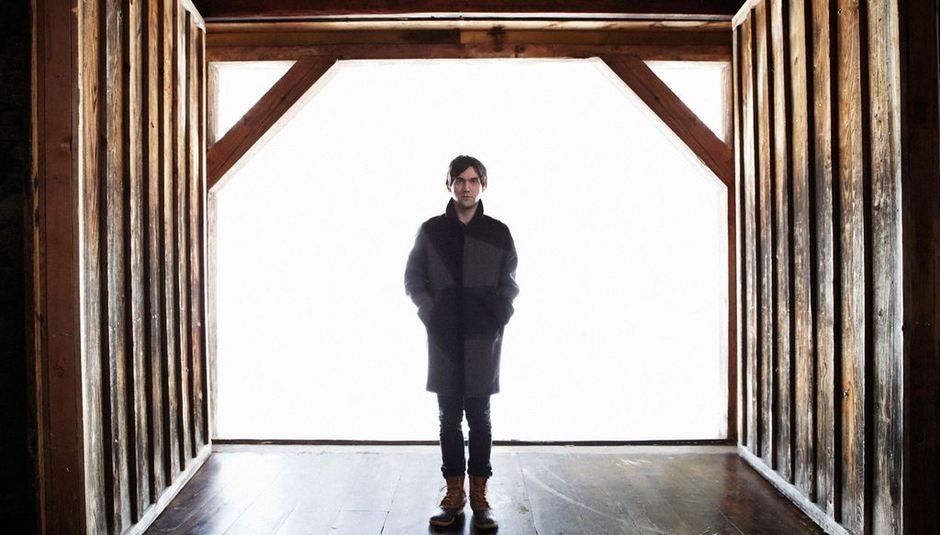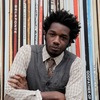Hesitantly walking into the immaculate lobby of one of London’s leading hotels two ladies in powder puff pink twinsets greet me with smiles whiter and more polished than the pristine floor we’re standing on. Promptly directed down a blood red carpeted staircase to the hotel’s dimly lit basement and into a windowless mahogany clad room - where the only furniture is just four lone chairs facing each other in the centre - today’s interview seems more fitting for a secret meeting with the Illuminati than an chat with America’s prodigal son, Conor Oberst.
Walking into the room, hand outstretched and breaking into a warm smile Conor couldn’t be anymore at odds with the sterile surroundings. Any preconceived misgivings of him being a tricky interviewee are quickly eased as he breaks the eerie silence to joke about getting lost in the basement’s maze-like corridors. In town on a whistle-stop press tour to promote his latest album Upside Down Mountain, he shows no signs of weariness talking enthusiastically in a continuous chain-of-thought that has no time for pauses.
Written over three years, one of the longest writing periods of his career, Upside Down Mountain is Oberst’s most intimate record in years. It sees him returning to a more personal standpoint of his earlier albums as he deliberately sought to create a conversation with the listener after years of distance.
Never an artist to stick to a straight trajectory the record has Conor changing course once more leaving behind the Mystic Valley band - who he worked with on his past two solo albums with - to go it alone. Well, as alone as any Conor project can ever be as the record is graced with appearances by First Aid Kit, Macey Taylor from The Mystic Valley band and some serious slide guitar by producer Jonathan Wilson.
Over the next 20 minutes Conor talks in-depth about the building of Upside Down Mountain with Jonathan Wilson, why he identifies with Neil Young in his need to not be a crowd pleaser, how he feels about the reception of his last two solo albums, his move to a major label with Nonesuch records, why Inside Llewellyn Davis was not for him, and if Bright Eyes will ever blink once again into light of day.
On Upside Down Mountain you worked with Jonathan Wilson, Andy LeMaster, Macey Taylor, Blake Mills and First Aid Kit. Why did you choose to work with them?
I guess, it’s sort of circumstance. I demoed with a bunch of different producers and was trying to figure out what kind of record to make – I had all the songs done but wasn’t exactly sure of what direction to go in or style - and one of the people I ended up doing some of the demos with was Jonathan Wilson. We got along really well and I felt like our communication was working; we’ve been friends for a really long time but we had never made a proper recording together so I decided to do it with him.
We were working in LA and he’s a pretty busy guy – he plays in all these bands and does a lot of stuff - so we got some of the songs started and then I took it back to Omaha and Andy LeMaster came up from Athens and we just worked in my studio there. The way it always works: working on a song, need something, call someone in [laughs].
One thing that Jonathan and I had talked about was finding threads that could come in and out of the song, like sonic threads that could bring some cohesion to the record. Obviously his playing is one of the major ones, just that slide guitar sound of his which I love and that comes in and out of a lot of songs. First Aid Kit being another one - having the same people, same harmonies on multiple songs on the record to create cohesion.
Compared to other records I’ve made the songs were written over a pretty long period of time, like three years so I didn’t know how well they’d fit together. Some of my other records were written in a conceptual way: “this is the idea”, “let’s have songs about these themes". This was a little more disparate, so the idea of finding more sonic threads to tie it together was one thing Jonathan and I were conscious of.
Listening to the record it does flow nicely as one piece - it’s consistently country but there seems to be Latin American influences there too. Would you say that’s something you were interested in?
Yeah, rhythmically we were trying to explore… I wouldn’t say “we were going for African sound or South American or whatever”, but being willing to explore different rhythms than just the four-four rock stuff. Also, I wanted to experiment and try different things, but it’s always finding that fine line between doing something new but also not drowning the songs in some kind of fake, stylised thing – I feel like I’m always walking that line.
So you don’t feel like you’re being a tourist in another genre ?
Yeah, exactly. Stretch it as far as you can go, but still within what I do I guess.
You worked on your two previous solo records with the Mystic Valley band. The last album you did with the band, Outer South, was very collaborative with the other members contributing songs. Why did you decide not to work with them on this album?
That was kinda like its own thing that record, it happened almost by accident in a way, we’d been on tour for a whole year together and had grown really close as a band. The fun thing about the Valley band is that it’s such a live band, so I had never made a record that way where you go into the studio at the end of a live tour. It’s kind of always the opposite, you make the songs in the studio and then you go on tour, and at first the band’s not good at playing the songs and then by the end the band’s really good at playing the songs but you can’t record again as the album’s already out.
With that Outer South record with The Valley band we’d been on this huge long tour and literally pulled the tour bus up into a studio in Texas and recorded another record. So many guys in the band write great songs themselves, so I wanted to get that out there but I feel like some people didn’t understand that.
How did you feel about the critical reception because it was a bit…
I feel like no one listened to it or who did didn’t care. Like with that kind of stuff I’ve learned to stop putting too much stock in what people say about my records. But I can understand why it was a hard record to get your head around, because it’s like: “this guy’s name’s on it but then there’s four other singers and it doesn’t make any sense." All I can say is that to us it made sense, at the time.
Is it important to you to introduce different players at different points in your career, sort of like Neil Young did. Is that important to you creatively?
Totally, in that to me I always get a lot of inspiration out of new collaborations and working with different people. Neil Young’s a good example of someone I look up to that has had a long career and has made a bunch of different records - I can’t say I’m a fan of all of his records.
There are points where he really tested his fans, like in the 80s when he went rockabilly with The Shocking Pinks to piss off Geffen. He really doesn’t give a fuck
Exactly and I think that’s the best way to be if you’re going to be an artist. I think one of the more dangerous places to be as an artist is if you start to believe that you know what your audience wants and then you start to want to provide that for them, and I think then you just start to make really terrible music.
For me it’s always been that I don’t preconceive too much, I just follow my impulses at the time and things are often at times a reaction to other records I’ve just made. I also have a bad personality trait in the sense that if I do something that people like, I tend to want never do it again or do something totally different. I have that slight self-sabotage quality or kind of want to be like a contrarian - I don’t know why that is and I kind of wish that I wasn’t like that
Being rebellious?
I guess so [laughs]
With the record you’ve said it’s more personal and move back to how you used to write. What prompted that changed?
Again, I think it was sort of in a way a reaction, well not a reaction, but just coming off the last Bright Eyes' record which I really made a point; that’s another record where I feel like I don’t know what people thought of it or it didn’t seem to me at least that some people got it or gave it enough of a chance… I wanted purposely the language on that record to be very dense and to have it be a thing where you have to listen to it a lot of times.
I kinda wanted the contrast between very accessible poppy music - which I feel like that was like that was the most poppy, straight-up, accessible songs that Bright Eyes ever had – except I wanted the words to be very dense like you needed some sort of like decoder to understand. And we did it and I feel like, I mean to us it was successful in a sense that we made the kind of record that we wanted to make.
Once that was over then I started writing songs, which eventually turned into this record. I guess I just was ready to go back to a more conversational style of writing, it’s not like confessional, I would categorise it as conversational like it’s pretty straightforward,it’s hopefully like a friend talking to you.
A lot of my friends who got into your music when they were teenagers (for me it was a bit later in my twenties) still have this very fixed bond with your early work even today
Wow, even now! That’s brutal.
There still seems to be this constant comparison between what you’re doing now and your early work. Do you ever feel constrained by these comparisons?
I mean so much of that seems like just another lifetime completely, and I’m happy that people relate to it. It’s been interesting because as I’ve gotten older and I’ve noticed a lot on the last Bright Eyes tour that the audience has become very mixed generationally: there’s like the people that are my age, mid-thirties, that have probably been around for all of the records and then there’s even older people - least in America where you get played on NPR, the public radio station - there will be like these 50, 60 year old people that are still really interested in music but they find it through that pattern.
Then there’s always like high school kids and I think a lot of them don’t even care about what the new record is, but they were introduced to whatever like Fevers And Mirrors or old records by some older person and they attached to it. I think that’s cool, for my generation (I guess the record was older by the time I got to it), but I think a record like the first Violent Femmes record. Y’know, there’s a certain percentage of every high school freshman class that’s like: “here’s the Violent Femmes, the record you’ve been waiting for!”
I think like you said earlier about how records can be a conversation, that’s especially important when you’re at that age where you’re trying to work things out and need someone to empathise with you.
Absolutely, I think empathy is…I wish there was more of it in the world, y’know?

The artwork for Upside Down Mountain is a painting by Ian Felice. Why did you choose that painting for the artwork?
I’ve always loved his paintings and he’s actually one of my favourite songwriters ever; The Felice Brothers is his band he’s like the main songwriter in that band. Before he started writing songs he was a painter and went to art school, so I’ve seen his paintings over the years in passing and that one that’s on the cover really struck me; in real life it’s like 10ft tall and just that image, I just love that painting and I have for a long time and when I was making the record I’d just think about it.
Then I asked him, well I thought it’d be cooler I was like: “hey, would you make a painting for my record?” So I gave him the music and he ended up making this other beautiful painting, which is now on the back of the album.
That’s good otherwise it would’ve been frustrating for him to hear, “I like the other one, sorry!”
I did go back to him and I was like, “Ian, thank you so much I love it but please can I have that one?” and he was totally cool about it. There’s another one on the vinyl; the vinyl’s this gatefold thing and I haven’t seen it yet but I’m excited to as inside there’s another one of his called, ‘Firing Squad’, which is super beautiful and instead of putting any other words in there I was like just ‘leave it'.
You’re releasing the album on Nonesuch a subsidiary of Warners, so it’s really your major label debut. Why did you make that move?
I’ve always admired that label, they celebrated their 50th anniversary this year and have been so eclectic, like it’s amazing all the different kinds of music: classical, jazz, world music, and obviously a lot of what I do - what do you call it? Contemporary rock music or something? For me it’s sort of the best of both worlds where I really trust and admire the people that run label, like this guy David Bither in New York who I’ve know for a long time.
They’re like true music fans and they’re not chasing trends and they really are into career artists that do different things, like what we were talking about - they do really believe in that. I don’t know if it’s by flukes, but they manage to have insane successes too as they did that Buena Vista Social Club record in the 90s which sold like a zillion records and now like the Black Keys. Hopefully it’s the best of both worlds.
You auditioned for the lead role in Inside Llewellyn Davis, which went to Oscar Issac. Would you ever consider acting again?
I never say never, because who knows? Life is long and I do like the movies. I don’t know if film to me is; I’ve made friends who are in that business and you think records are hard to make? Making films it takes 200 people and everyone’s got to be doing their job well and even then there’s someone with the money saying: “cut it up!” “new edit”. It seems an intensely frustrating job or career to be in.
Marcus Mumford was the Associate Music Producer on the film. Is that something you’d like to do? Or, would you like to write a score for a film?
I’ve given some songs to the movies. Actually, Mike [Mogis] and Nate [Walcott] from Bright Eyes are getting really into that - they’ve been scoring several movies and they’re working on one now. Again, it’s a different thing as you’re not really in control you have to make music to please the directors and producers, so it’s also frustrating but it would be great. I think for them they have to do it for a while, play the game for a while, and hopefully if they get enough films under their belts then they can maybe start to have a little more control.
Are you going to work again with Bright Eyes, Monsters Of Folk or Desaparecidos again?
Desaparecidos, we’ve been working slowly towards a full length, so I have a feeling...I don’t want to jinx it here [knocks the wooden table], but my guess is that will probably be the next thing I do after this record.
Upside Down Mountain is out now via Nonesuch. conoroberst.com






















